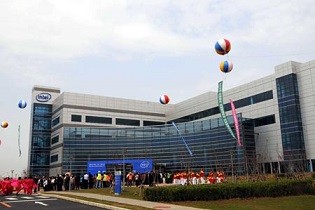Intel’s Dalian plant will shift its production course from making processors to Nand flash memory chips, according to a recent statement released by the leading chipmaker Intel, the Want China Times reported.
According to the report, the 12-inch Dalian plant had been a "star" investment project with significant industrial influence and also admired as a role model of the transformation of China's manufacturing industry.
Sina's tech news service Chuangshiji said that Dalian plant's shift came after its initial project failed due to several factors that included changes in the industrial manufacturing sector, Intel's business strategies, Chinese and American technologies, and the global economic crisis.
The report said that the Dalian project was part of a rivalry between Chinese and American technologies. The U.S. control over technology exports to China has consequently weakened Intel's competitiveness, due to the requirement that the U.S. must have a two-generation technological advantage.
The Dalian plant used 65-nanometer technology when it began commercial operations in 2010. But in the last quarter of 2009, Intel's plants in the U.S. were already using 32-nanometer technology, the report said.
According to Chuangshiji, the development of the industry was affected by these game rules.
Another factor is the outbreak of the global financial crisis in 2008 that severely hit Intel's investment in Dalian. The semiconductor industry had also been affected by the slowdown. An internal document by former Intel CEO Paul Otellini predicted that in the first quarter of 2009, the company would register its first loss in 21 years.
During the crisis, Intel closed down five factories in the U.S., Malaysia and the Philippines, before laying off workers and suspending operations at its Putong plant in Shanghai and shifted production to Chengdu.
The third factor is the rise of the mobile Internet and the economic crises which continue to affect the global PC industry.
The report said that these factors would explain Intel's decision to change its production course in Dalian, Chuangshiji said, noting it would not have helped the city's GDP, nor local employment, if it continues to remain on its course, which would also eventually affect Intel's political and enterprise links.



























